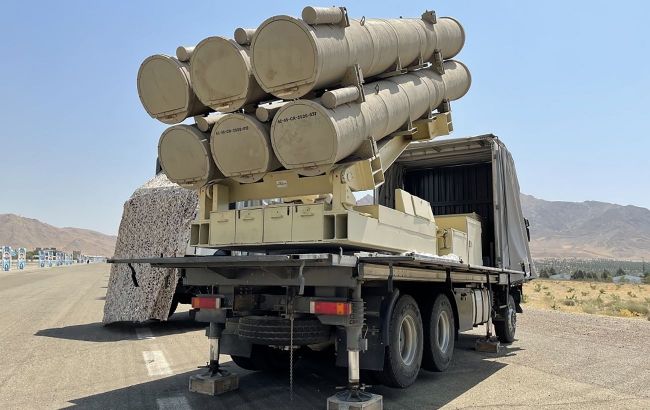Iran prepares to transfer Fath-360 missile launchers to Russia - Media
 Russians may gain the ability to strike Ukraine with Fath-360 missiles (Photo: farsnews.ir)
Russians may gain the ability to strike Ukraine with Fath-360 missiles (Photo: farsnews.ir)
Iran may soon transfer launchers for short-range ballistic missiles to Russia, which Moscow is likely to use against Ukraine, according to Reuters.
Two Western security officials and one regional representative, speaking on condition of anonymity, told the agency that the launchers in question are the Fath-360. If transferred, this could enhance Russia's offensive capabilities and further strengthen the military cooperation between Moscow and Tehran.
The Fath-360 missiles have a range of up to 120 km and could be used for striking Ukrainian troops near the border with Russia, including military facilities and populated areas.
In September of last year, the US government stated that Iran had delivered ballistic missiles to Russia on nine ships flying the Russian flag. According to three sources, launchers were not part of this shipment.
Western security officials and a regional official, speaking on condition of anonymity, noted that the delivery of Fath-360 launchers was inevitable. They declined to provide further details on the expected transfer, including why, in their view, the launchers were not delivered with the missiles.
Russia's Ministry of Defense and Iran's permanent mission to the UN did not comment. The US National Security Council redirected inquiries to the State Department, which also did not respond. The CIA declined to comment.
Diplomatic efforts under threat
According to Reuters, the deployment of missiles by the Russian army could complicate US President Donald Trump's diplomatic efforts to negotiate a ceasefire between Ukraine and Russia, as well as the ongoing talks with Iran regarding the limitation of its nuclear program.
A regional official stated that one of the reasons for the delay in transferring the launch systems was indirect US-Iranian negotiations mediated by Oman. Despite some complications, Iran announced that the fourth round of talks in Oman will take place on Sunday, May 11.
Experts believe that Tehran views its military-technical cooperation with Russia separately from the dialogue over its nuclear program.
"That the Iranians are negotiating on nuclear issues with the U.S. will not be seen as connected to what they might do in collaboration with the Russians," said Jack Watling, a senior research fellow at the Royal United Services Institute think tank.
What makes Fath-360 dangerous
Additionally, according to analysts, Tehran was forced to adapt commercial European trucks for use in its own launch systems. Russia is likely making similar modifications due to the loss of a significant amount of military equipment on the front lines.
Experts believe that the transfer of Fath-360 launchers could give Russian forces an advantage in delivering operational strikes on key targets near the front line.
"They (Fath-360s) don't need a lot of launch preparations. Their flight time is incredibly short," noted Fabian Hinz from the International Institute for Strategic Studies (IISS).
Experts estimate that the use of Fath-360 would allow Russia to conserve more accurate missiles, including the Iskander, for strikes on critical infrastructure targets such as Ukraine's energy system. This, in turn, places additional strain on Ukraine's air and missile defense systems.
"The Fath-360 is designed to be handled and operated by people with relatively little training. Why would they (Russia) buy inferior Iranian missiles? The only reason I could think of is that they cannot produce a sufficient number of their own missiles. They're not super accurate and they don't carry a very large payload. But it just adds to Ukraine's headaches," said Ralph Savelsberg, a lecturer at the Netherlands Defence Academy.
Transfer of Fath-360 to Russia
In August 2024, several Western media outlets reported that Iran planned to deliver hundreds of short-range ballistic missiles, Fath 360, to Russia.
Iranian Fath 360 missiles are satellite-guided, carry warheads weighing 150 kilograms, and can strike targets within a 120-kilometer radius. Experts consider them to be analogous to the American HIMARS rocket systems.
In February of last year, Reuters also reported that Russia had received hundreds of Zolfaghar missiles, which are capable of hitting targets at a distance of up to 700 kilometers.
Experts have explained the key features of the Fath-360 missiles in comparison to other analogs, such as the Ababil.

